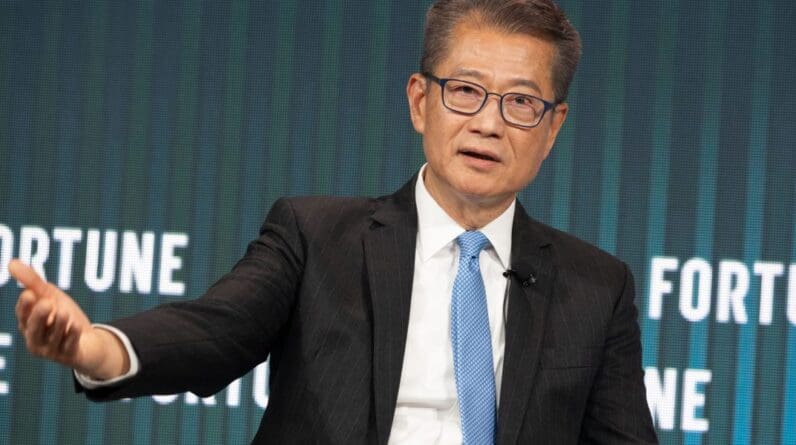
The Chinese city of Hong Kong had a rough 2023. Hong Kong’s economy grew by 3.2% last year, slightly slower than economists expected, and far below the government’s forecast of 4-5% at the beginning of 2023. A hoped-for post-COVID boom in travel and retail has fizzled out. A slower-than-expected Chinese economy is also dragging down the city’s stock market, with the Hang Seng Index now hovering around the level it was in July 1997, when the city returned to Chinese sovereignty.
“It pains me to admit it, but Hong Kong is now over,” Stephen Roach, the former chairman for Morgan Stanley Asia, wrote in a Financial Times opinion piece in February.
To make matters harder for Hong Kong, worsening tensions between the U.S. and China could put the squeeze on the city, which has long thrived on having links to both the Western and Chinese economies.
Paul Chan, Hong Kong’s Financial Secretary, is preaching a much different narrative: A more complicated international environment makes a place like Hong Kong essential.
“The geopolitical challenge will be there for quite some time,” Chan said in a conversation with Fortune editor-in-chief Alyson Shontell at the Fortune Innovation Forum in Hong Kong on Wednesday.
“Given the current situation, the unique status of Hong Kong, under the One Country, Two Systems structure, becomes even more important,” he said, referring to the structure in which Hong Kong will maintain legal, regulatory and economic systems apart from mainland China until 2047. In recent months, Chinese officials have suggested the system might persist beyond that date.
“We are different from the rest of China, in terms of our way of doing things in business, our standard procedures,” he said. “This is a natural platform for you to get access to the mainland market, and as a springboard for Asia at the same time.”
Still, Hong Kong is looking to markets outside of China, the U.S. and Europe for new opportunities. The Middle East in particular is a target for Chan. “This part of the world is less familiar to [Middle Eastern investors],” he said. “We even considered using the Hong Kong Investment Corporation [the city’s new investment company] to seed some of the new investments together.”
The Hong Kong government is also trying to attract more people to the city with a new talent visa, where those earning more than 2.5 million Hong Kong dollars ($320,000) a year, or graduates from one of the world’s top 100 universities, can get a visa to live and work in Hong Kong. “They do not need a job,” Chan noted.
National security
The city’s financial secretary also responded to concerns that Hong Kong’s new national security legislation could be a threat to its economy.
Last week, Hong Kong’s government speedily passed expanded ‘Article 23’ national security legislation, which criminalized acts like theft of state secrets, sabotage, and external interference. The new law follows an earlier national security law imposed by Beijing in 2020 after social unrest gripped the city in 2019.
The U.S. and U.K. governments, among others, have criticized the legislation as reducing Hong Kong’s freedoms and violating the One Country, Two Systems structure. (Officials in Hong Kong and Beijing have blasted such accusations as interference in Chinese internal affairs.)
Chan defended the new legislation on Wednesday, noting that the city was constitutionally obliged to pass a law of that nature. “When you scrutinize [the Article 23 legislation], it’s no different from leading jurisdictions like the U.K.,” he said. “We want to ensure stability and safety…so that we can concentrate our efforts to develop the economy.”
While Chan did cite “not very fair” storylines about Hong Kong, he said it was incumbent on the city’s government to “reach out” and invite more engagement.
“If people can come, make an investment, and make money, and for people to work on their career development and enjoy [their] lifestyle, then we will be able to succeed,” he said.







